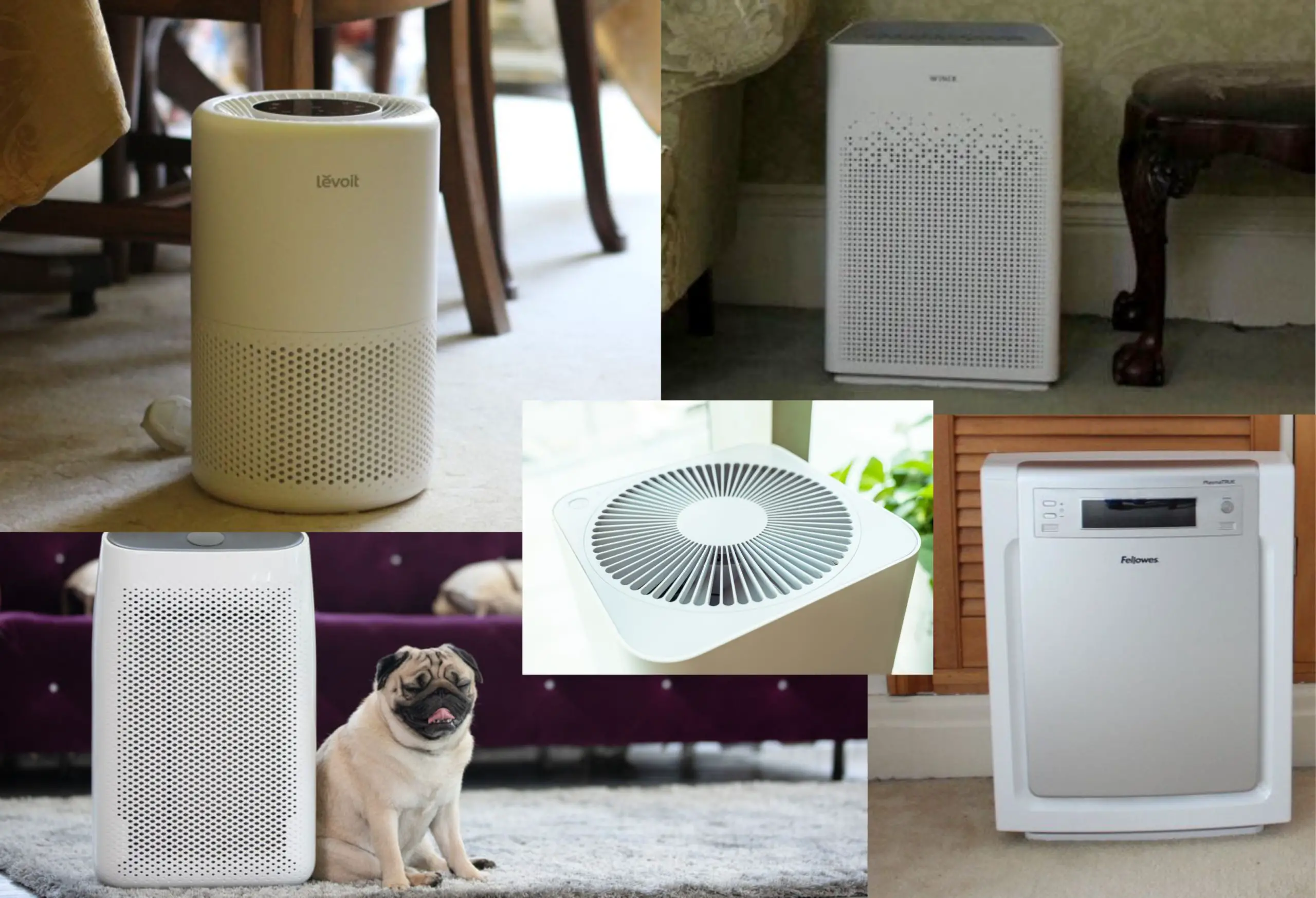This is a great question, one that gets more interesting the more you think about it. Most of us spend 90% of our time indoors in homes and workplaces that are better insulated and sealed than ever. So any pollutants or particles have a hard time getting out and tend to buildup in the recirculated air. This can lead to an indoor air quality that is worse than the outdoor air quality. Also the outside air quality is lower than updated WHO standards for 98% of the US population.
So do we all need an air purifier?
There is overwhelming evidence that particles in the air damage health, causing heart attacks, dementia, premature death and other health conditions. Air purifiers reduce particle count in the air by 80-90%. So to protect you and your family’s health you almost certainly need air purification.
The effect of particles on human health is a fascinating subject. You may not yet realize it, but the epidemiological/clinical data suggests that if you reduced the particle count in your air, you would be smarter, happier, and even better looking!
So let’s now look at some of these studies and decide are air purifiers worth it?
Health Effects of Airborne Particles
Airborne particles have been shown in clinical or epidemiological studies, often multiple studies, to cause-
- Coronary heart disease-heart attacks
- Strokes
- Premature aging of the lungs
- Chronic obstructive pulmonary disease
- Pneumonia
- Cancer
- Lymphoma
- Diabetes
- Skin problems including skin aging
- Autoimmunity
- Osteoporosis
- Diabetes
- Kidney disease
- Dermentia
- Cognitive decline-decrease in thinking ability
- Parkinson’s disease
- Vision impairment-age related macular degeneration and glaucoma
- Impairment of sense of smell
- Sleep disturbance
- Depression
- Anxiety
- Increased risk of psychiatric problems
- Decrease in fertility
- Increased miscarriage
- Exposure during pregnancy linked to neurological problems, asthma, lower IQ in child
- Children-lower intelligence and delayed psychomotor development, faster decline in cognitive function in adulthood
- Children-chest infection, asthma
- Children-increased obesity
- Children-increased psychiatric problems
- Children-death rate increased
- Premature aging?-ultrafine particles speed up several processes involve in aging
- Premature death
Like me you may be struck by the severity of the effects on the fetus and child. However stroke, dementia, breast cancer, blindness and premature death in adult life are also fairly severe consequences of particle pollution. Also there are even more health conditions related to air pollution, this is a basic list-for further details please see this article-“Airborne Particles and Chemicals Affect Us All Now“.
For those who are parents please note that air purifiers in classrooms in a US school increased pupils English and Math scores. In China air pollution was found to reduce cognitive (thinking) ability in children and also in adults so much it was equivalent to 1 years less schooling. This affect on thinking ability was particularly severe in older adults.
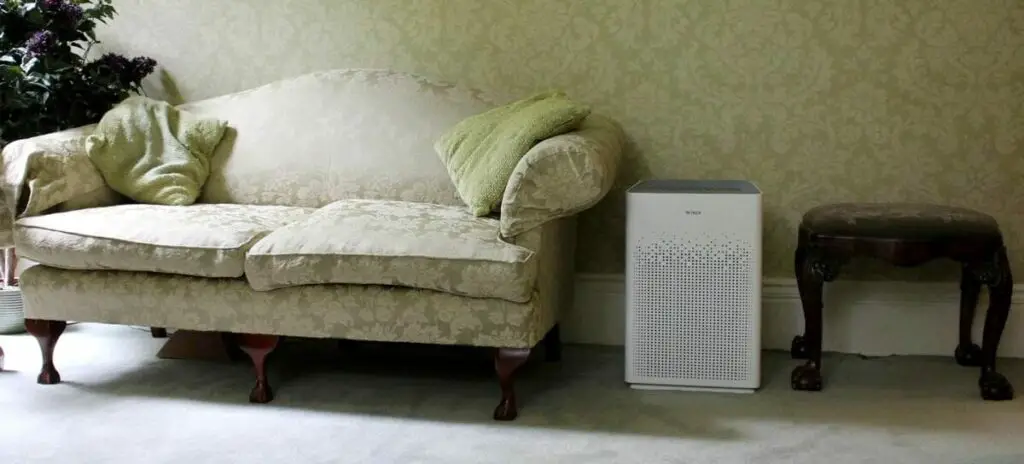
Air Purifiers Are Very Effective at Reducing Particle Count
There is no doubt that air purifiers reduce airborne particles. A true HEPA filter is the cornerstone of modern air purifiers. UV light and ionic air purifiers do not deal with particles as effectively as a HEPA air purifier does. A HEPA filter easily removes with large particles such as pet dander, mold spores, dust, and dust mite but also fine particulate matter such as tobacco smoke.
To illustrate how well air purifiers can reduce particle count, I performed an experiment. I used an iQair HealthPro Plus air purifier on its maximum setting providing 9.4 air changes per hour, in a room with the door and windows closed. The readings were on normal room air and I used a Trotec PC200 particle counter to count 0.5um diameter particles. This size is the smallest particle size that laser diffraction technology can accurately measure.
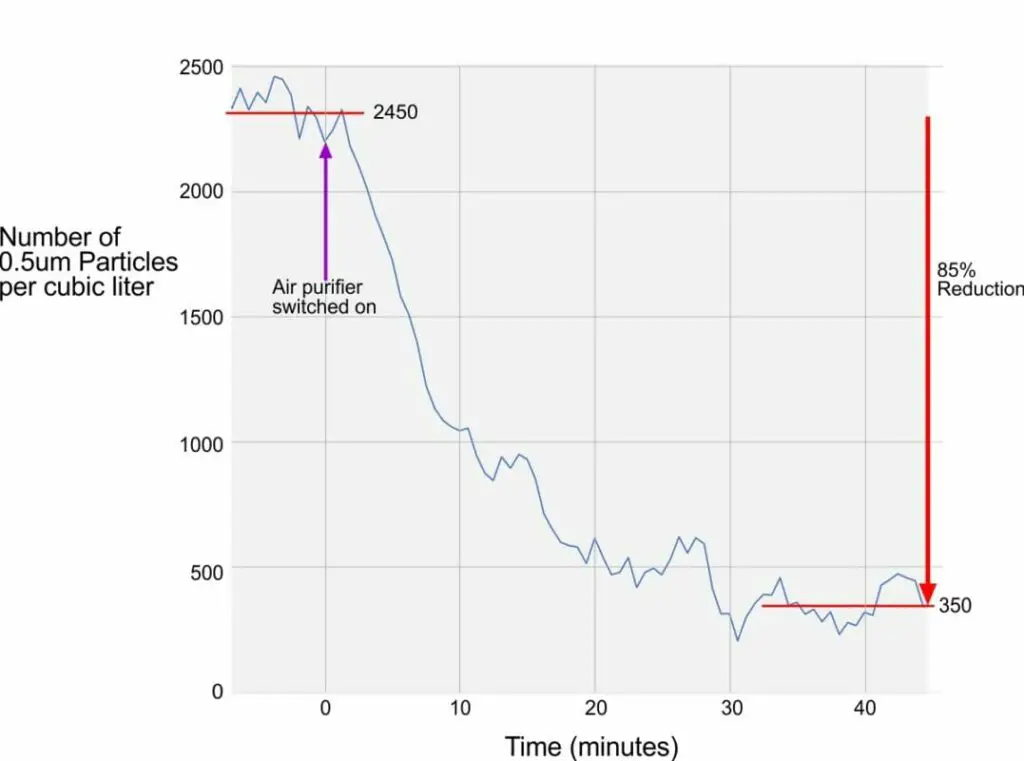
So you can see with the air purifier on its maximum setting and providing 9.4 air changes per hour, the reduction in particle count only mildly exceeded the EPAs minimum target. This shows that it is crucial to be careful in buying an air purifier and to check that it really will deliver a minimum of 5 air changes per hour for your room on a fan speed that produces a noise that you can tolerate. For further details of how to buy an air purifier please see this article-“Buying An Air Purifier“.
However, there are other airborne pollutants such as chemicals, so nearly all air purifiers also have an activated carbon filter. Activated carbon filters remove a wide range of chemicals particularly volatile organic chemicals and even ozone. Volatile organic compounds are responsible for odor and so an activated carbon filter will remove or at least markedly reduce an unpleasant odor.
An HVAC whole house air purifier is possible, but a HEPA specification one will probably need remodeling of your HVAC system. HVAC filters can be very poor at dealing with indoor air pollution. You should check that your HVAC system has a minimum of a MERV13 filter as lower MERV specification filters can be so poor that they remove less than 50% of airborne particulates, as explained in this article-“The Best HVAC Filter“.
Before you upgrade your HVAC filter, you should check with an HVAC engineer as an upgraded filter will reduce airflow through the system and may damage it, as explained in this article-“Make a dream “Whole Home Air Purifier” from an HVAC System“.
Air Purifiers Also Reduce Chemicals
Air purifiers have carbon filters to remove chemicals. The most common chemicals that need removing are those in cigarette or wildfire smoke.
The main chemicals in wildfire smoke are-
- Acrolein
- Formaldehyde
- Benzene
- Hydrogen cyanide
Most of these chemicals have been linked to cancer.
These chemicals can be removed by absorption onto activated carbon in air purifier filters. This is explained in more detail in this article-“How Do Air Purifiers Work“.
Different air purifiers have different amounts of activated carbon in their filters and so a different ability to remove chemicals. Here is an article outlining the best air purifiers for removing chemicals from the air-“Best Air Purifier for Smoke“.
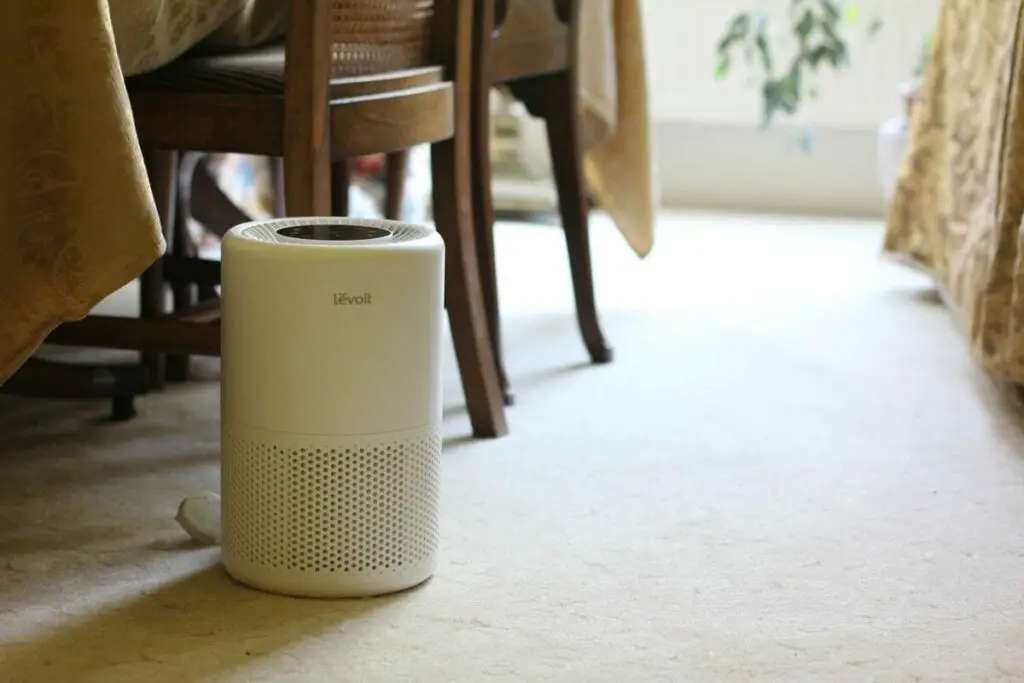
Air Purifiers are Worth Buying For People With Some Medical Conditions, if a Vulnerable Age (Pregnant/Child/Elderly) and During Pandemics
Medical Conditions
If you have a medical condition, then you should ask your doctor if it could be affected by particles in the air and if so consider using an air purifier. It would be a good idea for anyone who has any condition on the above list of medical conditions or in this article to have air purification at home.
Also women who are pregnant or are intending to become pregnant should consider using an air purifier, especially if they are living in a polluted environment. An air purifier should be used especially at home but possibly even at work-there are good desktop personal air purifiers.
There are 24 million people in the U.S. with asthma, including 6 million children, it would be wise for these people to at least try a good air purifier with good technique to see if reducing airborne allergens makes their asthma any better. In addition, there are at least 6 million more with seasonal and perennial allergic rhinitis who should at least try an air purifier to reduce airborne allergen to see if this eases their symptoms.
Pandemics
There is no doubt that air purifiers reduce the transmission of viruses. Of course they cannot eliminate transmission completely because the air may transfer from one person to another before it gets anywhere near the air purifier. Even so it is worth having good air purification during a pandemic if people from the home are mixing with the public.
During the SARS epidemic air purifiers were felt to be helpful at reducing infection. The reduction in viral load in the air will decrease both the chance of developing an infection and its severity.
One study during the COVID-19 pandemic investigated the detection of viral particles in the air on a ward when HEPA air purifiers which included a UV light were used to filter the air. Measurements were taken over a three-week period, for the first week air purifier was off, it was then switched on for a week and then for last week was switched off. In the week where the air purifier was on there was no detectable COVID-19 virus in the air, but there was virus in the air when the air purifiers were off.
It is thought the beneficial effect was due to the HEPA filter, the effect of UV light in an air purifier is of uncertain significance and especially in these air purifiers where the speed of airflow through the machine is very high.
Purifying the air reduces the chance and severity of infection through the reduction of viral load inhaled. Also the severity of infection can also be lessened by the air purifier reducing the number of particles of pollution in the air. Air pollution is present to a greater or lesser extent across all developed countries and is linked to many illnesses, including severe viral respiratory infections so the more advanced the filter the better.
Viruses are not the only microorganism that air purification with a filter will remove. Other airborne pathogens, such as airborne bacteria and fungal/mold spores will also be removed.
For People Without Medical Conditions
Vulnerable Groups Without Medical Conditions
Pregnant women, children and the elderly are all particularly vulnerable to airborne particles. So it is somewhat more important that people in these groups have an air purifier.
Living in Highly Polluted Areas
If you live in a highly polluted area, it is essential to have an air cleaner/purifier to lower your pollution risk.
Examples of such areas-
- near busy roads
- areas that have forest fires
- cities
- near some forms agricultural production
For People in Areas With Low Pollution Levels-with no excessive indoor pollution
Ultrafine Particles
Even in low pollution areas there are 1-2 million ultrafine particles per cubic liter of air. A liter is about 1/4 of a gallon. You will be breathing in about 600 litres of air per hour containing about 1 billion ultrafine particles.Ultrafine particles are so small that they can reach the deepest parts of the lungs and enter our bloodstreams.
Ultrafine particles may also increase the rate at which we age! For further information please see this article on ultrafine particles-Airborne Ultrafine Particles-do they accelerate aging?
So it is possible that everyone would benefit from an air purifier-unless of course particles entering our bloodstreams and our brains is a good thing!

There are only a few manufacturers that certify their air purifiers ability to remove ultrafine particles (smaller is better) here are a few-
| UltraFine Particle Removing Ability | Specified to remove particles down to a diameter of- |
| iQair air purifiers | 3nm |
| Winix AM90 | 3nm |
| Coway-some newer models | 10nm |
| Orsani | 20nm |
Here is the amount of activated carbon in the carbon filters for reducing the chemicals in smoke (more is better)-
| Chemical Removing Capacity | Amount of Activated Carbon in Filter |
| iQair Multigas | 12lb |
| iQair HealthPro Plus | 5lb |
| Orsani EJ120 | 3.5lb* or 1lb |
| Coway 400S | 1.5lb |
| Small cheap air purifier | 0.1lb |
*for the granular activated carbon filter, the pleated carbon filter option has 1lb of “media”
Here is the air flow per decibel (Higher is better)
| Noise | Air Flow per decibel at highest speed keeping noise under 50db | Air Flow per decibel with air purifier on highest speed | ||
| Coway 400S | 6.8 | 8.2 | Quietest per unit air flow | |
| Oransi EJ120 | 6.1 | 5.6 | ||
| iQair HealthPro Plus | 3.4 | 5.1 | Loudest per unit air flow | |
| Winix AM90 | 1.9 | 4.6 |
With all these machines you can buy generic filters that are much cheaper than the manufacturer’s filters-but you should not buy them. This is because you have no way of being sure that they even work, let alone meet the standards for removing ultrafine particles that the manufacturer specifies. This is a significant issue as you are going to be staking the protection of your health on their air purification.
Fine Particles
So should people without medical condition living in low pollution level areas consider purifying their air? I would suggest that you buy an air quality sensor/meter and measure the air quality in different rooms in your home. Certainly if the PM 2.5 is above 5 g/m3, the WHO safe level, then it probably would be wise for you to buy air purifiers and reduce particle count in the air. However even if the PM 2.5 is below this level you may wish to look at some of the recent medical evidence outlined in this article. Also you may live in an area with particular pollution problems for instance with chemicals, and that may be the main reason that you need an air purifier.
If you are going to stake your future health on measuring the air quality in your home, I would recommend the iQair AirVisual Pro. There is a helptul article here-“How to test air quality in your home“
For People in Areas With Low Pollution Levels-with significant production of indoor air pollution
For some homes there will be significant production of air pollution actually in the home. An air purifier will deal with this very well but depending on the clearance of the air pollution there are other specifid measures that can be taken depending on the type of pollution–
| Source of Pollution | Particle Pollution | Chemical Pollution | Solution |
|---|---|---|---|
| Smoking | Yes | Yes | Stop smoking or smoke outside |
| Candles | Yes | Yes | Stop using candles |
| Cooking (Oven, grill, frying) | Yes | Yes | Steam food, ventilate stove to outside |
| Traffic Nearby | Yes | Yes | |
| Mold | Yes | No | Dehumidifier and remove mold |
| House Dust Mite | Yes | No | Dehumidifier |
| Pet Dander | Yes | No | Vacuuming |
For all homes periodic ventilation is important.
You May Need an Air Purifier to Remove Odors/Chemicals
Air purifiers with activated carbon filters are very good at removing chemicals. As chemicals are the cause of most odors, and air purifier can be very helpful at removing volatile organic compounds causing the odor. Of course you also need to remove the source of the odor.
There are areas of countries that are heavily polluted with chemicals, such as “chemical alley” in the US. In these areas cancer incidence tends to be higher, and so an air purifier the good carbon filter which will remove chemicals is helpful.
Are Air Purifiers Good?
As a whole, the scientific and medical evidence clearly points to many adverse health effects from airborne particles. Air purifiers can lower these more than 80%. So on balance using an air purifier seems an extremely good idea. However, no one is likely to notice beneficial effects immediately, but over the years an air purifier user would be expected to have better health.
If you do Decide That you Need an Air Purifier-important points in buying and using an air purifier
In one review of studies where air purifiers were used, fine particulate matter was reduced between 23-92%. Bear in mind the EPA recommends a minimum reduction of 80%. So even in experimental studies with training in how to use the air purifiers, most air purifier users failed to hit this target. On the other hand, it shows that air purifiers, when used well, can decrease particle count by 90%. This just emphasizes the importance of how you use the air purifier.
- Buying an air purifier-the air purifier should have a true HEPA filter, adequate air flow (CADR) at a noise that you can tolerate for long periods. The air purifier should be “smart” that is programmable or capable of being made smart. The most difficult part is buying one with an adequate air flow at a noise that you can tolerate for long periods as most air purifiers are too loud on their maximum fan speed and manufacturers usually do not give data on air flow and noise at lower fan speeds. There is helpful advice about buying an air purifier here-“Buying an air purifier”. Alternatively, just buy the recommendations on this site. If you want the quietest air purifier you may wish to read this article-“Best Quiet Air Purifiers“, if you need one that will remove particles very well but is particularly good at removing chemicals from the air, for example from forest fires, please see this article-“Best Air Purifier for Smoke“.
- Position the air purifier at least 12 inches from any wall-so that the air coming out of the air purifier joins in with the circulation of air in the room. There is advice about using an air purifier in this article-“How to Use an Air Purifier“.
- Run the air purifier for at least 30 minutes before entering the room. This is because it takes an air purifier this long to reduce the particle count in the room. So the air purifier that you buy needs to be smart or capable of being made smart by plugging it into a smart plug.
- Run the air purifier continuously when you are in the room at the highest setting that you can tolerate long term. This is because the higher the setting that you run the air purifier on the lower the particle count in the air will be. There is no lower threshold known below which human health does not improve, so the lower the particle count/PM2.5 the better. Health aspects of particle count/PM2.5 are outlined in this article-“Airborne Particles and Chemicals Affect Us All Now“.
- Never run the air purifier using its inbuilt sensor-there are 7 reasons that you should not do this as outlined in this article-“How to Use an Air Purifier“.
- Always test the air with an air quality meter where you are going to sit at the height in the room where your mouth and nose are. Comparing the measurements before and 45 minutes after switching the air purifier on there should be at least an 80% reduction in particle count as the EPA recommends. Testing that the particle count/PM2.5 is adequately reduced by your air purifier is the most important thing that you need to do. Air quality meters can be brought really quite cheaply eg $35, there is a helpful article about them here-“How to Test Air Quality in Your Home“.
- How many air purifiers do I need?-at least 2 but maybe 5 or more. Please see this article “How many air purifiers“.
Conclusion
There is no doubt that inhalation of particulate matter harms human health. There is also no doubt that air purifiers when used with good technique lower particle count more than 80%. When particle count is lower in the environment, there are fewer heart attacks and strokes. So it may seem obvious that you need an air purifier.
However, no long-term trials have been done to investigate the benefit of using an air purifier, so you may prefer to wait until there are long-term trials of air purifier use. The downside of this approach is that you may wait 20 years or longer only to find out that you should have been using an air purifier all along. During this time there may have been damage to your health that an air purifier would have prevented.
Suppose that you do buy an air purifier. It will probably cost you about $300 per year and you can always stop if research comes out showing that lowering airborne particle count does not help human health.
Suppose that you do not buy an air purifier and subsequently find out that it was necessary, you may for 30 years have been more depressed or anxious than you need be, had worse sleep, been less intelligent, had a heart attack or stroke, developed dementia, be destined to die prematurely… or suffered any of the other potential health problems from airborne particles and chemicals. If the data stays the same or looks worse as time goes on you cannot go back, some of the damage will have permanently affected your body.
So on the balance of the data that we have at the moment personally I think that everyone does need an air purifier.
Fortunately there are good air purifiers that start at $80.
Related Questions
Related Posts
“Best 4 air purifiers for asthma and other allergies“
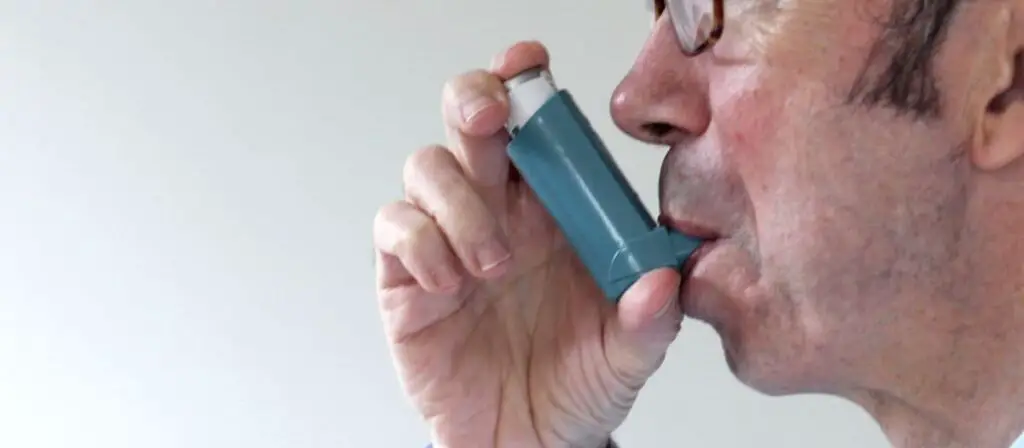
“Best Air Purifier For Viruses”
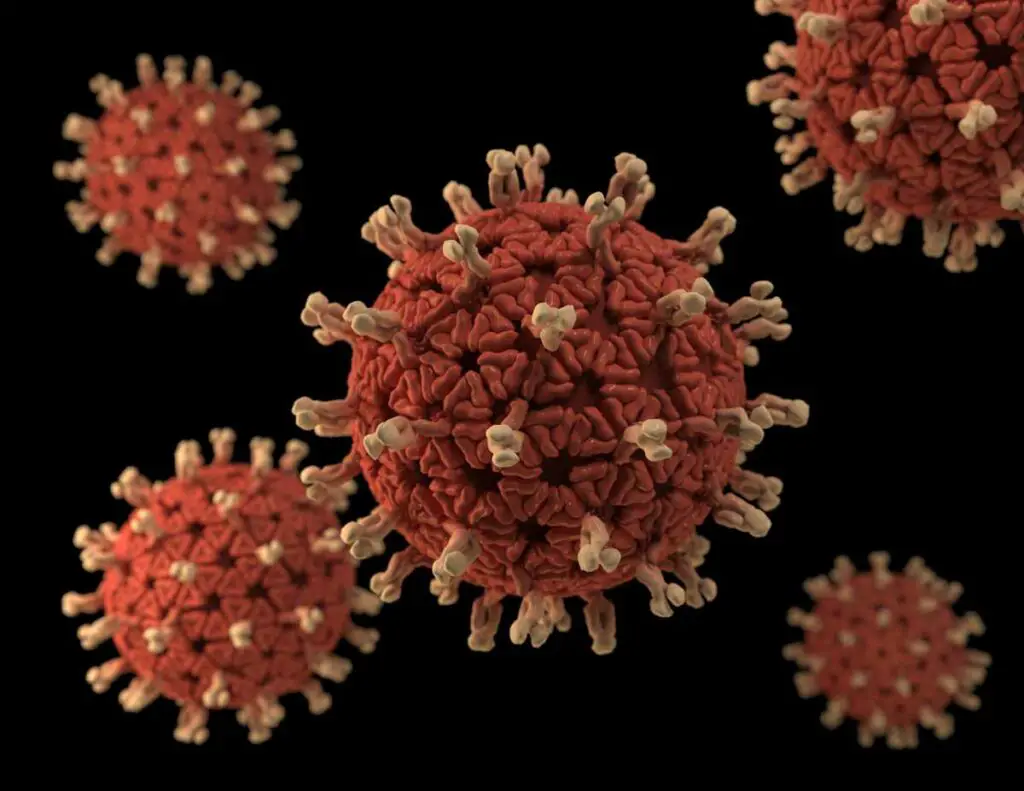
“Best Air Purifier For a Baby”


